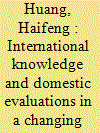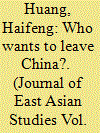| Srl | Item |
| 1 |
ID:
140816


|
|
|
|
|
| Summary/Abstract |
Do knowledge and information about foreign countries affect people’s evaluation of domestic situations? Using unique survey and experimental data, this research finds that Chinese citizens with more positive perceptions and especially overestimation of foreign socioeconomic conditions have more negative evaluations of China and the Chinese government. Moreover, correcting socioeconomic misinformation about foreign countries improves one’s evaluations of China, indicating that the causal direction is at least partly from rosier estimation of foreign conditions to lower domestic evaluations. The relationship between domestic evaluations and international political knowledge, as measured by familiarity with political affairs and figures in foreign countries, is typically not significant, although awareness of political instability in other countries can increase satisfaction with one’s own country. These results contribute both substantively and conceptually to the study of politically relevant knowledge and information, and shed new light on the nuances of information flow and opinion formation in changing societies.
|
|
|
|
|
|
|
|
|
|
|
|
|
|
|
|
| 2 |
ID:
149311


|
|
|
|
|
| Summary/Abstract |
The notion of ‘suzhi’ (素质), which roughly means human quality or character, features prominently in public and intellectual discourses in China about the country’s social and political development, including the prospects for democratization. Despite the pervasive use of the concept by both the government and society, few studies have analyzed whether suzhi is really the root cause of the myriad social issues that have been attributed to it. This article problematizes the notion of suzhi and shows through simple game-theoretic analyses of two heavily debated issues in China that such a predominant focus on suzhi is misguided and misses the crucial role of social expectations in multiple-equilibria social interactions. In fact, without good social expectations even ‘high suzhi’ people would behave as if they were of ‘low suzhi’, which perhaps best characterizes many social phenomena in contemporary China. The results of the study thus have critical implications for a successful social and political transition.
|
|
|
|
|
|
|
|
|
|
|
|
|
|
|
|
| 3 |
ID:
153319


|
|
|
|
|
| Summary/Abstract |
Why are Chinese people moving abroad in unprecedented numbers? Using unique experimental and survey data, this research finds that Chinese citizens with more positive perceptions and, especially, overestimation of foreign socioeconomic conditions are more interested in going abroad. Moreover, correcting socioeconomic overestimation of foreign countries reduces their interest in leaving China, indicating that there is a causal effect from rosier perceptions of foreign conditions to higher interest in going abroad, and emigration does not always represent well-informed “voting with the feet.” The relationship between international political knowledge and exit intentions, on the other hand, is not significant or consistent, suggesting that Chinese citizens’ interest in going abroad is more socioeconomic than political in nature. These results contribute to the study of citizen misinformation, challenge a prevalent assumption in the international migration literature, and help us understand one of the most important social trends in the world's largest developing and authoritarian country.
|
|
|
|
|
|
|
|
|
|
|
|
|
|
|
|